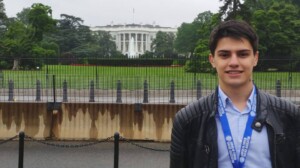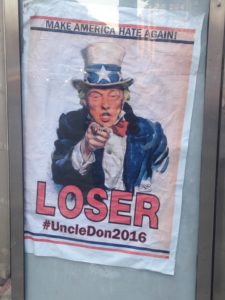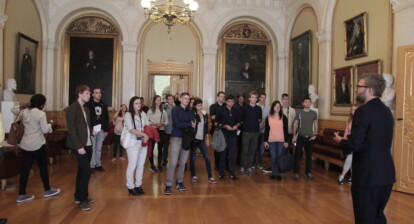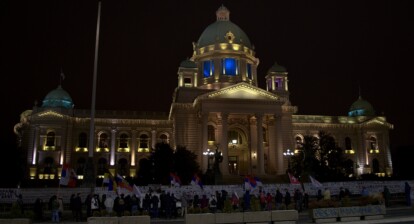In case you ever wondered how a European student of politics and philosophy feels like going to bed with Trump and Clinton or how he would cope with the election campaign craze in Washington, D. C., you can now find the answers in Martin’s new column.
A Transatlantic Comparison

Martin reporting from Washington D.C.
About three months ago, on 9th of May, I set off on my first trip to the land of the free and home of the brave – the United States of America (USA). I had barely exited the JFK airport when I noticed a big smiling Donald Trump, staring at me from a poster on the utility pole. Ah yes, the United States is electing its president this year.
In the next two months, hundreds of Trumps and Clintons were staring, smiling, shouting and yelling at me from utility poles, street lamps, brochures, “Make America Great Again” placards on the National Mall, newspapers, magazines, the TV, the radio, my mailbox, my fridge…
Observing the Nuances of American and European Elections
Quite normally, one would feel overwhelmed by the great abundance of campaign materials. For me, however, it was a completely different experience. Politics felt more real than ever; everything was happening before my eyes. From a mere spectator at the beginning, I slowly became more and more involved after every debate, conversation or scandal. Not only were the protagonists of the elections very active, but also the audience with its extensive expert analyses and comments was present at all times. The highly intellectual atmosphere in Washington definitely contributed, too. My politics textbooks, everything I have read or wrote about, was coming alive in front of me.
As a first-time visitor in the USA, a curious Politics and Philosophy major, a young European with passion in history, I could not resist, but analyze these elections. What a better way to analyze a ’foreign phenomenon’ than to compare it to something familiar? How are the American elections different from European ones and what are the common points of both election and campaign systems? The following 3 differences and 3 similarities between the American and the European elections are a result of careful thought and first-hand experience in both continents. The differences:
Politics as a Show
The habit of waking up and going to bed with Trump or Clinton was definitely a novelty for me. Republican and Democratic debates that run for hours are broadcasted live on the major TV channels in the country. Experts and commentators are giving their more or less qualified opinions on newspapers, articles. The Internet is flooded with posts about the “potential dangers of Trump becoming a president” or “the repercussions of Hillary Clinton’s email scandal”. The punch lines of most jokes on comedy shows necessary involve at least one presidential candidate.
It is not that the people are extremely politically engaged here; it’s just that the media covers the elections all the time. It seems to me that the media is successfully capitalizing on the unconventional and extravagant candidates this year – Sanders and Trump. Aware that scandals and drama keeps the ratings high, the TV channels did not hesitate to broadcast, play on repeat and overanalyze every single insult or offensive remark. The Republican debate not once or twice saw more personal insults and altercations than actual debate on policies and measures. Probably because of a lower media coverage of political debates the ‘media craze’ in Europe looks much less severe during any type of election.
Contrasting Campaign Length and Coverage
It is not only the extensive media coverage that inflates the balloon of the American elections. Furthermore, the elections themselves are grandiose. A campaign that lasts for more than a year is bound to overshadow the European ones, usually lasting for no more than three months. For example, in Bulgaria, the parties tend to announce their candidates for the presidential race only about a month before the actual voting day. Unfortunately, there is consequently no chance to put the candidates to test in debates or journalistic investigations.
Politics as Business
In the United States, politics is highly intertwined with business enterprises. Support of lobby groups determines the stances of the candidates and even their voting patterns. It comes as no surprise when bundlers and donors become appointees on ambassadorial and other high-level posts from the ‘political quota’ (versus the career one). Similarly, endorsements in the United States can give a substantial boost to the candidate – everyone was waiting for Obama’s or Sander’s endorsement of Clinton and Paul Ryan’s endorsement of Trump.
In Europe, the link between politics and business is there, too. However, when it comes to elections, it is a rarity to see corporations or CEOs actually endorsing or campaigning for their candidates. In fact, in some countries there are even laws banning large donations from a single individual in order to precisely restrict the influence of the lobby groups. In those countries, the parties receive subsidies based on the number of votes they receive. In addition, the short campaigning time in Europe makes running for president much cheaper, and thus ‘frees’ the candidates from having to search for donors, which, in turn, in theory would make them less dependent on large corporations.
European Politics to the Left
This is not an observation from these elections particularly, but it was definitely most noticeable during the current presidential campaign. When it comes to the left-right, liberal-conservative division of the political sphere, the whole of the European politics spectrum seems to be shifted at least one degree to the left of the American parties. For instance, while Obama had difficulty passing his Obamacare project (sometimes even doubted by his own Democrats), the conservative (right-of-center) David Cameron had no such problems advocating for more funding for the NHS.
Similarly, when it comes to issues like climate change or abortion, even the conservative parties declare their support in most Western European countries. What is more, Bernie Sanders, whose ideas of free education and healthcare are considered as “radical,” “wacky” and “leading the country into bankruptcy” by both Republicans and Democrats, would not gather any attention in the Scandinavian countries, and also in most of Europe.
Comparing Rightward Trends in the USA and Europe
And while it seems like Europe shifted to the left, in fact, it is the USA that has been moving to the right. The antagonism with the communism, the Baby Boomers and their Conservative Intellectual Movement, as well as the changing demographics changed things quite a bit in the USA at the end of the last century. With the return of far-right parties in Europe, we can only wonder whether Europe is taking a similar path these days.
Perhaps entangled with the right-wards shift in the American politics is the influence of religion. Republicans and Democrats alike evoke god in their speeches, “In God we Trust” is written on the dollar, and voters would discriminate against an agnostic candidate according to research. Coming from a country, where religion has more of a performative or tradition-based orientation, I was very surprised to see the dramatic difference between Europe and the United States on this matter.
And the three similarities:
Anti-Establishment Candidates
There have been multiple parallels between Trump’s xenophobic, anti-immigration and racists comments and the rise of the right-wing voices in European politics (Nigel Farage, Marine Le Pen, Geert Wilders, Norbert Hofer, etc.) in the last couple of years. The shocking negative reactions of governments and people in the face of the refugee crisis in Europe can certainly be compared to the disdain immigrants faced (and are facing) from certain large groups of citizens in the United States. And while it is too easy and almost comfortable to claim that these xenophobic voices belong to a small group of crazy, anti-social white supremacists (some of them indeed do), their success proves otherwise. The group is not that small, otherwise Trump would not have won the Republican Nomination or Hofer would not have been so close to becoming a president. Nor does the group consist entirely of privileged people gone mad.
A Need for a Status quo Disruption
If we leave aside the offensive comments by these candidates, we will see that a common underlying message, resonating with their supporters: a radical need for disruption with the status quo. Anti-establishment candidates (count Bernie Sanders and Ben Carson in) have achieved great success, because they appealed to a large group of dissatisfied people. The millennials, caught up in the economic crisis and with growing student debt, looked up to Bernie Sanders.
The working class, fearing the demonized (by media and politicians) immigrant and taken by surprise by the economic impacts of globalization and outsourcing, looked up to Trump, to Farage, to Le Pen. In all of their campaigns, claims about regaining sovereignty, in one or the other way, were present. “Vote Leave, Take Control” was the name of one Brexit campaign; “Make America Great Again” is the leitmotif of Trump’s campaign in the USA. A sense of nostalgia, a feeling that the world is changing way too fast for the mindset to adapt, emerged on both continents and created monsters. Monsters feeding on people’s fears, crushed hopes (crushed by economic crisis, by instability and terrorist threats, by immigration and culture shock) and dying (American) dreams took on the political stage, and served to awake the latent distrust towards the political establishment.
Rhetoric vs. Action

The question is how much is liberty going to suffer in the future, following the outcome of the elections (Source: private).
Even when the European Union was drowning in crises, words prevailed over deeds. The general magical spells about unity, European family and integration came to the front when Cameron decided to hold the Brexit referendum. Responsible and timely actions, not words are what the voters wanted. And they punished the EU. The same way as Republicans punished the GOP’s inadequate behavior in the last couple of years (shutting down the government, really Cruz?). Ironically, the punishers will be the ones who will suffer the most… along with politics and freedom.
Big gap in the Society
Until recently, the talk about the polarization of politics and society seemed reserved only for academics and only in the distant United States. The gap between Republicans and Democrats, between rich and poor, educated and uneducated, whites and the others, between Us and Them was not that present to such an obvious and dramatic extent in the “united Europe.” After all, Europe had created the European Union precisely to put to bed these kinds of conflicts. With the recent UK referendum however, the striking divisions in the British society (societies?) became apparent. The young ones, who overwhelmingly voted “Remain”, were outnumbered by the “Leave” decision of their grandparents and parents.
The destiny of the pro-EU Scottish and Northern Irish was decided by the nationalistic England and Wales. The gap between the educated and uneducated, between higher and lower classes could not be hidden anymore. And it is not only the UK. In Bulgaria, the country still splits into Russophiles and Russophobes every time the name of Russia is mentioned. In the European Union, the refugee crisis exacerbated the division between new members and old members, just the same as the financial crisis dissected the continent into North and South.
Navigating Crisis
It seems like both the United States and Europe are at crossroads, and important decisions wait upon. At times of crisis, it is too easy to split, to blame it “all on the establishment” and to revolt. Of course, there is nothing bad in revolting or demanding change. It is disastrous, however, when we let hatred and reckless decisions cloud our judgment. It is indeed destructive to give in to the life of a post-factual democracy, where platitudes, xenophobia and insults matter more than facts. Such societies do not need external threats or enemies…
Unfortunately, I do not have a recipe or a simple solution… I do, however, have a hope that reason will prevail at the end.
***
Before I leave the USA at the end of the month, I think I will see hundreds more times Clinton and Trump on TV, I will hear of dozens of scandals and jokes, and social media will explore once or twice more. Despite everything, there is one thing I cannot deny: following the American elections has been an extremely interesting experience – with their magnitude, influence and uniqueness this year.







